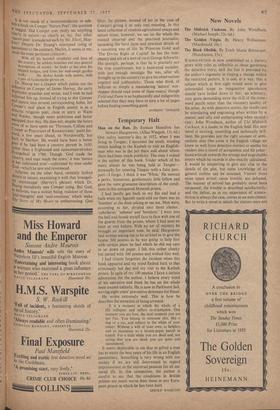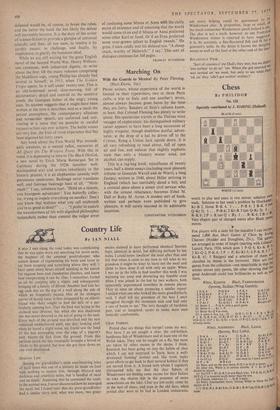New Novels
The Midwich Cuckoos. By John Wyndham. (M ichael Joseph, 13s. 6d.) The Black Obelisk. By Erich Maria Remarque. (Hutchinson, 15s.) The Black Obelisk. By Erich Maria Remarque. (Hutchinson, 15s.) SCIENCE-FICTION is now established as a literary genre with rules as inflexible as those governing the detective story; half the fun is provided by the author's ingenuity in ringing a change within the restricted pattern. It is odd, in a way, that a subject which at first sight would seem to give unbounded scope to imaginative speculation should have boiled down to this : an arbitrary, cosy game demanding more the skill of the cross- word puzzle setter than the visionary quality of the artist. As with detective stories, the results can be stimulating and engrossing when written by a master, and silly and embarrassing when second- rate : John Wyndham, author of The Midwiclr Cuckoos, is a leader in the English field. His new novel is exciting, unsettling and technically bril- liant. He provides just the right amount of semi- realistic data (the scene is the English village we know so well from detective stories) to soothe his readers into a mood of acceptance, and his poker- faced attitude towards the strange and improbable events which he records is also exactly calculated. It would be unsporting to give any clue to the details of the plot, but some knowledge of its general outline can be assumed. Visitors front outer space arrive; cause trouble; are defeated. The manner of arrival has probably never been surpassed; the trouble is described satisfactorily; and the defeat, as in my experience of science- fiction is always the case, comes as an anti-climax. But to write a novel in which the visitors were not
defeated would be, of course, to break the rules; and the better the book the less likely the defeat will inevitably become. It is the duty of the writer of science-fiction to provide a glimpse of universal anarchy and then, all too soon, to resolve it by earthly means; to challenge, and finally, by implication, to glorify the humanist ideal.
While we are still waiting for the great English novel of the Second World War, Henry William- son continues, with unhurried dignity, to write about the first. Of the many volumes comprising the Maddison saga, young Phillip has already had several to himself; in 1915, when The Golden Virgin opens. he is still under twenty-one. This is an old-fashioned novel, slow-moving, full of documentary detail and centred on the sensitive youth, the Georgian father of the angry young man. Its manner suggests that it might have been written at the time it describes, and as a result the period atmosphere, the contemporary allusions and vernacular speech, are unforced and con- vincing in a sense that no pastiche or careful reconstruction can ever achieve. The battle scenes are very fine, the fruit of vivid experience that has been digested for forty years.
Any book about the First World War immedi- ately awakens, as a mental reflex, memories of All Quiet On The Western Front. With this in mind, it is depressing to turn to The Black Obelisk, a new novel by Erich Maria Remarque. Set in Germany during the 1920s (another well- documented era) and written relentlessly in the historic present, it is an elephantine comedy with portentous undertones. Badinage never translates well, and German badinage least of all. ' "Mish- mash?" I say, somehow hurt. "Hold on a minute, you bourgeois adventurer ! You butterfly collec- tor, trying to impale everything on needles! Don't you know that without what. you call mishmash you're as good as dead?" . . "1 prefer to endure the transitoriness of life with dignified philosophic melancholy rather than commit the vulgar error
of confusing some Minna or Anna with the chilly secret of existence and of assuming that the world would come to an end if Minna or Anna preferred some other Karl or Josef. Or if an Erna preferred some over-grown infant in English tweeds." He grins. I stare coldly into his disloyal eye. "A cheap crack, worthy of Heinrich!" I say.' This sort of dialogue continues for 368 pages.
FRANCIS WYNDHAM

































 Previous page
Previous page